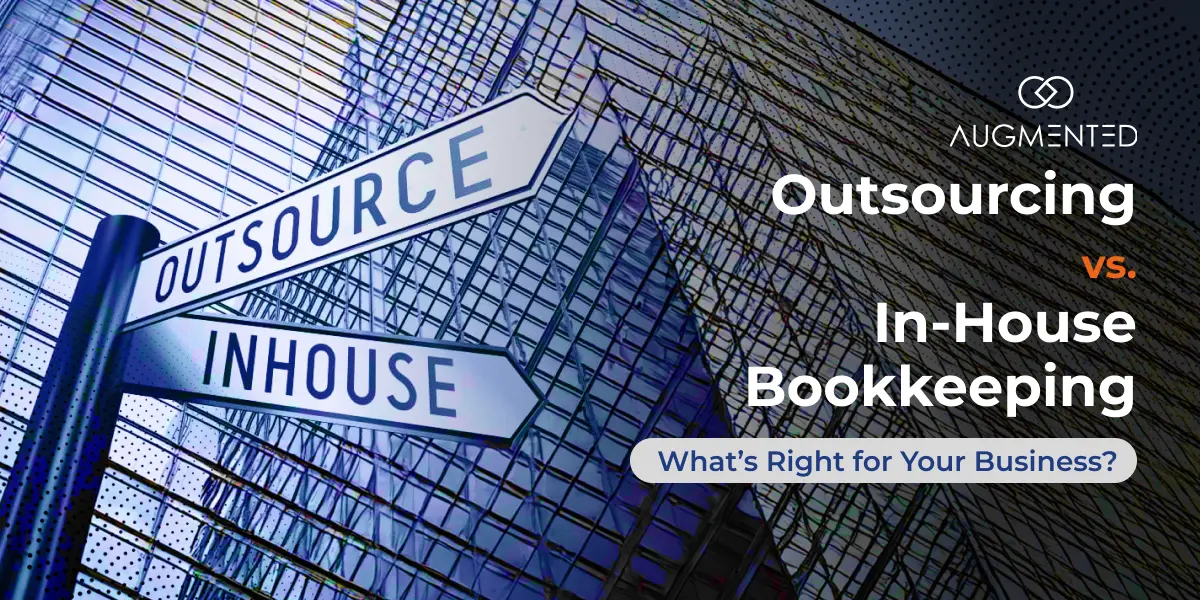Bookkeeping. Tax Codes. Financial headaches.
Fluctuating inflation, a labor shortage, and ever-changing tax laws are enough to induce a business panic, aren’t they?
Now, amidst this chaos of running a business, simplifying your finances is crucial. So, either you dive into numbers and juggle, or hand the reins to the experts and grow.
Not sure what to do?
What’s best for your Australian business? Consider the pros and cons and learn which is best: in-house or outsourced bookkeeping services in Australia.
Let’s start.
What is In-House Bookkeeping?
In-house bookkeeping is handling the accounting and finances of a business internally. Your in-house accountants handle all the financial operations for your business.
Let’s say you are a small business owner, trying to focus on your business growth and satisfying your customers. With just one in-house bookkeeper, you manage all the financial tasks internally. The bookkeeper is:
- Tracking transactions
- Managing accounts payable and receivable
- Payroll accounting for businesses
- Preparing and filing tax returns
- Bookkeeping,
- Budgeting,
- Forecasting ( and so much more.)
But is one single bookkeeper capable of taking care of all these responsibilities? Maybe not. Of course, you might prefer having the numbers to yourself, but isn’t it challenging? Yes, you are the captain of your financial ship, but at what cost?
Is hands-on control and easily available data worth the business mess? Curious to know more? Below are the benefits and drawbacks of in-house bookkeeping.
In-House Bookkeeping: The Advantages
Every dollar counts when running a business. And bookkeepers ensure that every dime you earn or spend is accounted for. In-house bookkeeping offers a significant advantage when it comes to controlling, customizing, and securing your finances.
Your in-house team is always on the ball, providing you with immediate access to financial data and ensuring the highest level of data security, giving you peace of mind.
- Do you have a question about financial transactions?
- Need a quick financial report?
- Have a unique financial idea?
- Want all your data to stay within your four walls?
Your well-versed in-house bookkeeper is dedicated to understanding and meeting your specific needs and preferences, providing a personalized and adaptable service.
But what about the high costs regarding salaries or potential training expenses? What about the time you spend diving into numbers instead of focusing on your customers? What if you miss the latest changed tax law due to workload in other business areas?
Chaos! A Business Panic.
In-House Bookkeeping: The Disadvantages
Imagine giving your customer a rain check. Why? Because you were busy with time-consuming bookkeeping tasks, such as reporting and data entry.
Of course, it is crucial to stay on top of your company’s financial health, but putting off a customer will not yield dollars for your finances. However, 64% of owners manage their books!
No wonder spreadsheets, debits, and credits seem straightforward. But then the question is, what keeps bookkeepers up all night? What about the messy back office, missing numbers, and missed customer meetings?
- Financial burdens
- Sky-high salaries
- A constant fear of errors
- Compliance headaches
- Limited expertise
- Ever-changing tax rules
- Technological troubles
- Distractions from core business goals
- Hefty penalties on missed deadlines
Are you ready to tackle all these challenges of in-house bookkeeping? Or would you rather focus on what you do best and let the experts handle your finances?
What is Outsourcing Financial Services?
Outsourcing financial services is the process of hiring a third party to handle various bookkeeping or accounting tasks. This helps you save valuable time to focus on other aspects of your business.
Outsourced accounting firms handle diverse aspects of your business finances. The outsourced firm maintains ledgers, files taxes, and helps you plan your finances (apart from many other tasks.)
But why would a business need outsourced accounting and bookkeeping services?
Let’s say your business is growing with an international customer base. You start facing complex financial challenges and juggling between diverse tasks.
- You have various income streams.
- You are also deciphering international tax codes.
- Staying on top of ever-changing accounting rules.
- Managing customers. ( And several other tasks)
Even your most skilled in-house team is now overwhelmed. What do you do? You either hire an accounting consultant or look for outsourced bookkeeping services in Australia.
So, do you want to have confidence in your numbers and come out of messy cash flows? Let’s look at the pros and cons of outsourced accounting and bookkeeping services.
Outsourcing Financial Services: The Advantages
Yes, outsourcing accounting work in Australia has risks. But, then, why are businesses considering outsourcing from the very beginning? Why is accounting a leading job being outsourced by Australian startups? (A survey from 57% respondents)
The answer is simple. As businesses grow, their financial landscape transforms. As businesses scale up in size, revenue and finances become increasingly difficult to manage.
Outsourced accounting firms help eliminate these challenges.
- Saves Costs
Outsourcing your bookkeeping can save you money. It eliminates the need for hiring, training, and retaining employees.
- Boosts Expertise
Outsourced accounting firms give you access to skilled professionals with expertise, knowledge, and experience. They have the latest accounting standards and tax law updates.
- Scalable
Another advantage of outsourcing is business scalability. With outsourced accounting and bookkeeping services, you can scale up and down according to your business needs.
- Focuses on Core Activities
Outsourcing gives you the time to manage core business activities. You won’t have to juggle multiple roles. Alleviate your burden of bookkeeping and concentrate on strategic growth and your customers.
- Improved Accuracy
You can get precise financial data in real-time with outsourcing. Using tools, accounting software, and technological advancements makes money management simpler.
Cloud-based platforms offer robust security and improved accuracy for your financial information, with professionals ensuring a reduced risk of errors.
- Compliance and Risk Management
Outsourced bookkeeping services in Australia comply with Australian accounting standards and tax laws. The firms follow all compliance requirements and adhere to the guidelines of the Australian Taxation Office (ATO)
Outsourcing bookkeeping and accounting services offers a range of benefits, from improved accuracy to scalability and compliance. But every coin has two sides, and so does outsourcing.
Outsourcing Financial Services: The Disadvantages
As we stand on the brink of technological revolution, dramatic shifts and challenges in the financial sectors are going to ‘brain drain’ people. No one can stop these waves as experienced professionals retire and business models change.
Moreover, by outsourcing your bookkeeping services, you may risk relinquishing control over your financial operations. Potential drawbacks include
- Communication breakdowns,
- Delayed responses and
- Reduced flexibility.
Additionally, overreliance on external providers and concerns about data security can further complicate your decision-making process.
But no matter what you opt for, accounting and bookkeeping services depend on carefully evaluating your business needs. It depends on your business size, financial resources and how scalable you want your business to be.
The Difference: In-House vs. Outsourcing
But, again, the question is, what is best for your business?
So, let’s get right to the point. Below are the key differences between in-house bookkeeping and outsourced bookkeeping services in Australia.
Dig in.
Bookkeeping is not for everyone. So first, evaluate what’s right for you and your business. Enlist your priorities, and based on your business and available resources, choose the one that perfectly fits your business needs.
Pro tip: If you are still unsure, feel free to contact accounting consultants or outsourced accounting firms, such as Augmented Systems.
Make the Right Choice for Your Business
You have a business to run. Invoices, customers, planning, strategies, employees—everything is stacking up. On top of all this, a single thought of paying taxes is enough to make you sweat.
The good news? You have a choice—between in—house bookkeeping and outsourcing. But before you make the choice, you need to consider factors like:
- The size and complexity of your business
- Your budget and resources
- Frequency of your transactions
- Your growth plans, and
- Your desire to scale your business
Ask yourself what you expect in terms of your finances. Do you want lightning-fast financials? Or do you prioritize cost-efficiency and the ability to scale with an outsourced firm? Not sure? Below are some numbers for you.
Numbers for Your Numbers
You may be ready to handle seasonal spikes and rapid growth, making flexibility a top concern. Or is tight cash flow forcing you to make tough business decisions?
No matter where finances are taking you, making the right decision is important.
So, let’s delve into some numbers to equip you with the confidence to make the best choice.
- Global cloud accounting software is booming. The market, valued at $4.78 billion in 2023, is not set to hit $7.33 billion by 2030. It is growing at a steady 6.2% annually.
- Tough time keeping up with the new rules. More than 50% of firms say that keeping up with the changing rules is their biggest challenge in accounting.
- Not future-ready. According to a study by AICPA (American Institute of Certified Public Accountants), 92% of CPAs are not ready for the future.
- Increased Revenue. The market size of accounting services in Australia (2024-2029) has grown at a CAGR of 2.1% over the past 5 years. It is estimated to reach $33.0 billion in 2024.
Over the past decade, Accounting in Australia has grown rapidly. While bookkeeping is important, most businesses focus on running other core business operations.
So, no matter how you handle your books, find a system that works best for your business. The key is to keep your business thriving.
Conclusion
Have you found the solution to your bookkeeping challenge? Stop spending hours on tasks that can be automated. Put your energy into driving business decisions, gaining financial insights, and meeting business goals.
Need help? Let our professionals handle it for you. More than 200 clients have faith in us with their accounting needs, and you can, too. Stop thinking and start acting. Talk to our experts today.


